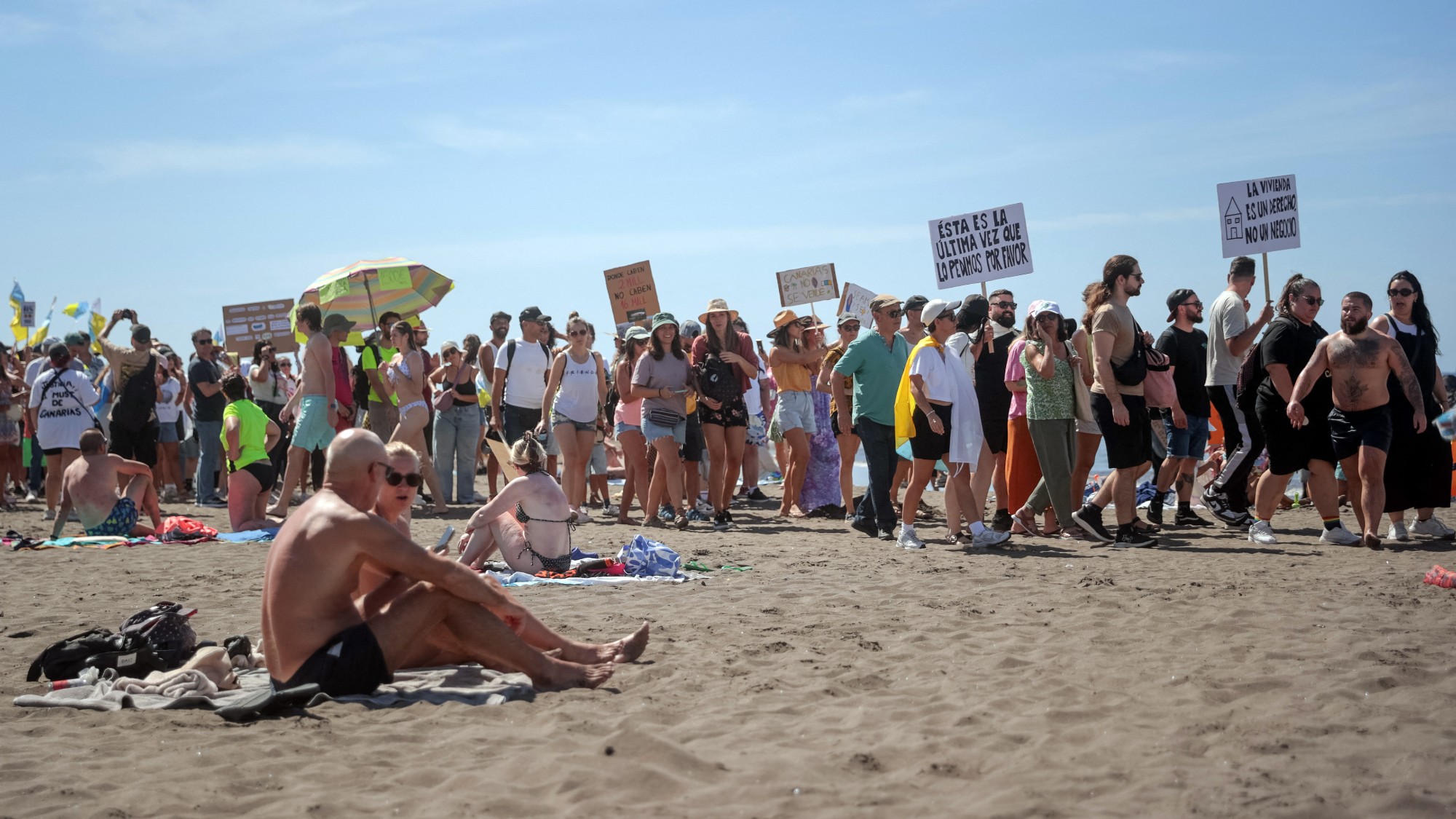The tourist flood in the Mediterranean: can it be stemmed?
Finger-pointing at Airbnb or hotel owners obscures the root cause of overtourism in holiday hotspots: unmanageable demand

A free daily email with the biggest news stories of the day – and the best features from TheWeek.com
You are now subscribed
Your newsletter sign-up was successful
"Here we go again," said Alessia Noto in TTG Italia (Rimini). Just as they did last June, the residents of tourist hotspots across southern Europe are taking to the streets to protest against the hordes of summer visitors swamping their towns.
"Tourism steals our bread, our roof, and our future," read the placards of protesters in Barcelona, a city of 1.7 million people that hosted 15.5 million visitors last year. "Everywhere you look all you see is tourists," chanted protesters in Palma, Mallorca, some firing water pistols at the holiday-makers. In Venice, where every luxury hotel is booked out for "the wedding of the century" – the nuptials of Amazon founder Jeff Bezos and Lauren Sánchez – activists unfurled a banner over the Rialto bridge with the message "No space for Bezos!".
The anger is understandable, said Hans-Christian Rößler in Frankfurter Allgemeine Zeitung. Cities such as Lisbon and Barcelona have become unaffordable. Rents are soaring: their cafés and bistros are being replaced by souvenir shops, burger joints and "bubble tea" spots. And one organisation in particular gets the blame: Airbnb. Last month, Madrid ordered the online platform to delist nearly 66,000 rental properties held to be breaking local rules; Airbnb's appeal against that order was rejected by a Spanish court last week. Meanwhile, Barcelona has decided not to renew the licences of 10,000 holiday homes set to expire by the end of 2028.
The Week
Escape your echo chamber. Get the facts behind the news, plus analysis from multiple perspectives.

Sign up for The Week's Free Newsletters
From our morning news briefing to a weekly Good News Newsletter, get the best of The Week delivered directly to your inbox.
From our morning news briefing to a weekly Good News Newsletter, get the best of The Week delivered directly to your inbox.
Unwilling to be made the scapegoat, Airbnb has come up with a report claiming that overtourism is "driven by hotels", says Alessia Conzonato in Corriere della Sera (Milan). In Barcelona, as in other tourist towns, nearly 75% of overnight stays in 2023 were in hotels, whereas regulations have caused the number of rentals to shrink by 50% in three years.
In the end, though, the supply of places to stay is driven by demand, said Juan Cierco in El Periódico (Barcelona), as is the supply of places on cruise ships (passenger numbers to Barcelona and Lisbon increased by 50% between 2022 and 2023), and of cheap flights (Ryanair has exceeded 200 million passengers for the first time in a single year). Spain closed 2024 as the world's second-most visited nation, with 94 million tourists. And as tourism represents more than 12% of Spain's GDP, the government must be wary of choking off demand with taxes and regulations.
But it's not governments who have to square up to the problem of overtourism, said Chris Christou on his "The End of Tourism" podcast: it's us. "When it comes to travel and tourism, if you love a place, leave it be. Don't go there."
A free daily email with the biggest news stories of the day – and the best features from TheWeek.com
-
 The Olympic timekeepers keeping the Games on track
The Olympic timekeepers keeping the Games on trackUnder the Radar Swiss watchmaking giant Omega has been at the finish line of every Olympic Games for nearly 100 years
-
 Will increasing tensions with Iran boil over into war?
Will increasing tensions with Iran boil over into war?Today’s Big Question President Donald Trump has recently been threatening the country
-
 Corruption: The spy sheikh and the president
Corruption: The spy sheikh and the presidentFeature Trump is at the center of another scandal
-
 6 exquisite homes with vast acreage
6 exquisite homes with vast acreageFeature Featuring an off-the-grid contemporary home in New Mexico and lakefront farmhouse in Massachusetts
-
 Film reviews: ‘Wuthering Heights,’ ‘Good Luck, Have Fun, Don’t Die,’ and ‘Sirat’
Film reviews: ‘Wuthering Heights,’ ‘Good Luck, Have Fun, Don’t Die,’ and ‘Sirat’Feature An inconvenient love torments a would-be couple, a gonzo time traveler seeks to save humanity from AI, and a father’s desperate search goes deeply sideways
-
 A thrilling foodie city in northern Japan
A thrilling foodie city in northern JapanThe Week Recommends The food scene here is ‘unspoilt’ and ‘fun’
-
 Tourangelle-style pork with prunes recipe
Tourangelle-style pork with prunes recipeThe Week Recommends This traditional, rustic dish is a French classic
-
 Samurai: a ‘blockbuster’ display of Japan’s legendary warriors
Samurai: a ‘blockbuster’ display of Japan’s legendary warriorsThe Week Recommends British Museum show offers a ‘scintillating journey’ through ‘a world of gore, power and artistic beauty’
-
 BMW iX3: a ‘revolution’ for the German car brand
BMW iX3: a ‘revolution’ for the German car brandThe Week Recommends The electric SUV promises a ‘great balance between ride comfort and driving fun’
-
 Arcadia: Tom Stoppard’s ‘masterpiece’ makes a ‘triumphant’ return
Arcadia: Tom Stoppard’s ‘masterpiece’ makes a ‘triumphant’ returnThe Week Recommends Carrie Cracknell’s revival at the Old Vic ‘grips like a thriller’
-
 My Father’s Shadow: a ‘magically nimble’ love letter to Lagos
My Father’s Shadow: a ‘magically nimble’ love letter to LagosThe Week Recommends Akinola Davies Jr’s touching and ‘tender’ tale of two brothers in 1990s Nigeria